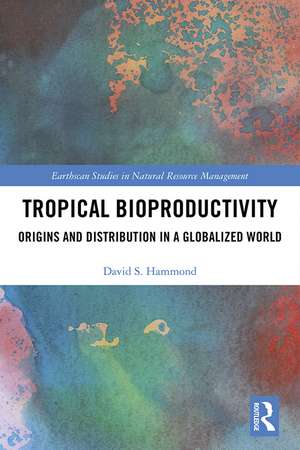Tropical Bioproductivity: Origins and Distribution in a Globalized World: Earthscan Studies in Natural Resource Management
Autor David Hammonden Limba Engleză Hardback – 16 ian 2019
The book examines the basic astronomical and thermal properties of our planet to illustrate the dynamic nature of the tropics and how the region resides at the very heart of global energetics, driving the environmental flows that shape planetary climate and bioproductivity. The author explores how the region’s relatively small, but hyper-productive, land area provided the groundswell for the economic, social, political and demographic changes that fuelled empires, European colonialism and nation-building. Also covered are discussions on how the critical intake of capital needed to fuel the industrial and technological revolutions driving modern globalization was first expropriated from the tropics by harnessing the region’s natural productivity and biological crop diversity and then transforming it into tradeable commodities using the inhabitants' labour and knowledge. With modern tropical nations accounting for the bulk of people living in poverty and registering some of the highest income disparities, the author presents cross-cutting evidence showing that their histories and the persistence of expropriating institutions have fostered anocratic tendencies, poor governance, unorthodox financial flows and mass migration.
Tropical Bioproductivity cuts across vast geographies, topics and histories to deliver a readable narrative that links people, places and events with the environmental mechanics of our planet. It will be of interest to students and researchers in the areas of environmental studies, economics, history, agriculture, anthropology and geography.
Din seria Earthscan Studies in Natural Resource Management
-
 Preț: 312.94 lei
Preț: 312.94 lei -
 Preț: 311.41 lei
Preț: 311.41 lei -
 Preț: 300.00 lei
Preț: 300.00 lei -
 Preț: 295.19 lei
Preț: 295.19 lei -
 Preț: 310.85 lei
Preț: 310.85 lei - 9%
 Preț: 868.82 lei
Preț: 868.82 lei - 18%
 Preț: 1000.27 lei
Preț: 1000.27 lei -
 Preț: 442.50 lei
Preț: 442.50 lei -
 Preț: 388.85 lei
Preț: 388.85 lei -
 Preț: 469.34 lei
Preț: 469.34 lei -
 Preț: 266.20 lei
Preț: 266.20 lei -
 Preț: 323.23 lei
Preț: 323.23 lei -
 Preț: 416.22 lei
Preț: 416.22 lei - 16%
 Preț: 274.25 lei
Preț: 274.25 lei -
 Preț: 456.50 lei
Preț: 456.50 lei -
 Preț: 445.56 lei
Preț: 445.56 lei - 26%
 Preț: 764.36 lei
Preț: 764.36 lei - 12%
 Preț: 325.34 lei
Preț: 325.34 lei -
 Preț: 389.66 lei
Preț: 389.66 lei - 18%
 Preț: 1001.70 lei
Preț: 1001.70 lei - 18%
 Preț: 1000.27 lei
Preț: 1000.27 lei - 18%
 Preț: 189.09 lei
Preț: 189.09 lei -
 Preț: 416.22 lei
Preț: 416.22 lei - 18%
 Preț: 1117.88 lei
Preț: 1117.88 lei - 26%
 Preț: 764.20 lei
Preț: 764.20 lei - 26%
 Preț: 764.20 lei
Preț: 764.20 lei - 18%
 Preț: 1000.27 lei
Preț: 1000.27 lei - 49%
 Preț: 544.75 lei
Preț: 544.75 lei - 18%
 Preț: 1000.27 lei
Preț: 1000.27 lei -
 Preț: 389.66 lei
Preț: 389.66 lei - 18%
 Preț: 1009.55 lei
Preț: 1009.55 lei - 18%
 Preț: 1013.52 lei
Preț: 1013.52 lei -
 Preț: 415.67 lei
Preț: 415.67 lei
Preț: 1009.55 lei
Preț vechi: 1231.17 lei
-18% Nou
Puncte Express: 1514
Preț estimativ în valută:
193.20€ • 200.48$ • 161.48£
193.20€ • 200.48$ • 161.48£
Carte tipărită la comandă
Livrare economică 15-29 martie
Preluare comenzi: 021 569.72.76
Specificații
ISBN-13: 9781138594609
ISBN-10: 1138594601
Pagini: 324
Ilustrații: 62
Dimensiuni: 156 x 234 x 19 mm
Greutate: 0.72 kg
Ediția:1
Editura: Taylor & Francis
Colecția Routledge
Seria Earthscan Studies in Natural Resource Management
Locul publicării:Oxford, United Kingdom
ISBN-10: 1138594601
Pagini: 324
Ilustrații: 62
Dimensiuni: 156 x 234 x 19 mm
Greutate: 0.72 kg
Ediția:1
Editura: Taylor & Francis
Colecția Routledge
Seria Earthscan Studies in Natural Resource Management
Locul publicării:Oxford, United Kingdom
Public țintă
Postgraduate and UndergraduateCuprins
Preface Part I Structure, Origins and Distribution 1. Two Tropics 2. Planet’s Powerhouse 3. The Blue and the Green Part II Exchange and Globalization 4. An Icelandic Banana 5. The Great Crop Swap 6. Sweet Salt and the Tropical Trade 7. Productivity’s Promise Part III Modern Consequences 8. Smaller, Younger, Poorer 9. The Braided Flow of Resources, Money and People
Notă biografică
David S. Hammond is Principal, NWFS Consultancy, based in Ashford, Kent, UK and Portland, Oregon, USA. He has undertaken environmental projects in a dozen countries in Latin America, Asia and Africa for clients such as WWF-UK, UNDP, UK DFID, IUCN and the Inter-American Development Bank. He was previously at the Iwokrama International Centre in Georgetown, Guyana, CABI Bioscience and Imperial College, UK.
Recenzii
"In Tropical Bioproductivity, Hammond examines the bioproductivity of tropics and how that bioproductivity relates to globalization over time. In particular, he focuses on how the biological wealth of the tropics spurred on European invasion and colonization in pursuit of economic growth, leading to great changes in tropical countries and ecosystems while also transforming Europe. Hammond follows this interplay through to the modern globalized economy to consider how the tropics’ unique bioproductivity has proven both a benefit and a burden for tropical nations. He brings an expansive approach to the topic; he draws on disciplines ranging from botany to economy to history, and he manages to weave these together into a compelling whole. Written with a storyteller’s sense of narrative and supported with ample quantitative data, Tropical Bioproductivity will be of great interest to those whose work focuses on the tropics, tropical ecosystems, and globalization." Summing Up: Highly recommended. Upper-division undergraduates through faculty --CHOICE (J. L. Rhoades, Antioch University New England)
Descriere
This book investigates the fundamental role that tropical bioproductivity - or more specifically Net Primary Productivity - has played in shaping the global geographies of food, finance, governance and people.
